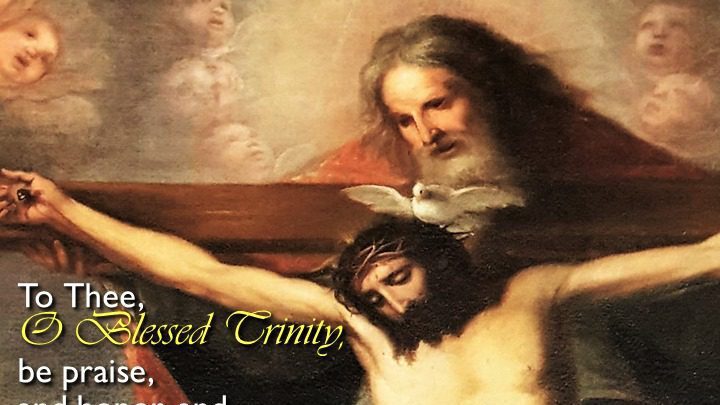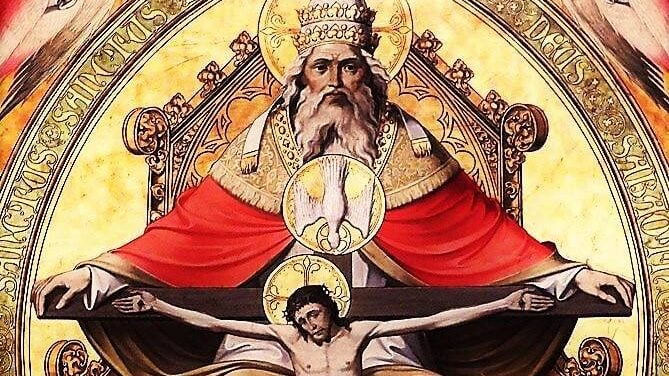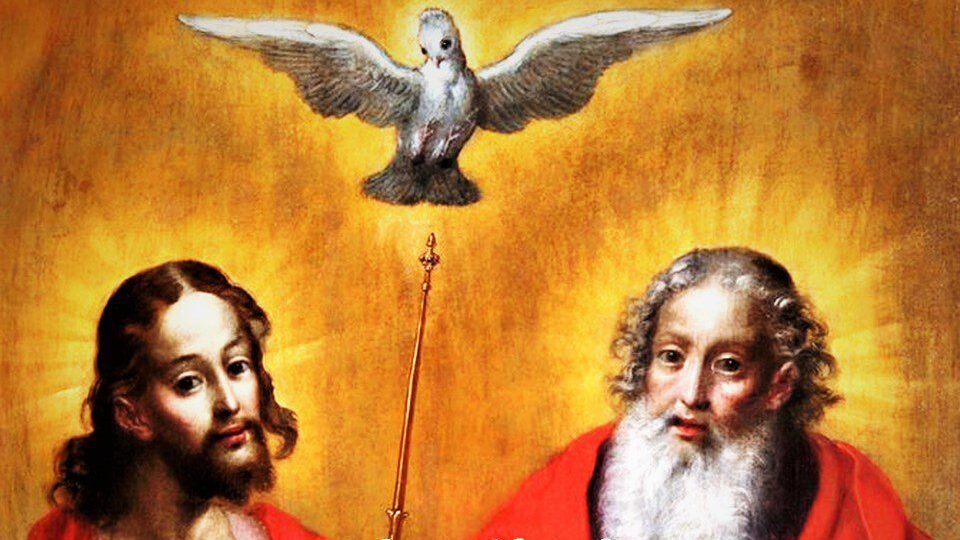POPE FRANCIS ON THE MOST HOLY TRINITY SUNDAY YEAR A.

ANGELUS
Saint Peter’s Square
Trinity Sunday, 4 June 2023
______________________________________
Dear brothers and sisters, buongiorno!
Today, Solemnity of the Holy Trinity, the Gospel is taken from the Jesus’ dialogue with Nicodemus (cf. Jn 3:16-18). Nicodemus was a member of the Sanhedrin, passionate about the mystery of God: he recognizes in Jesus a divine master and goes to speak to him in secret, in the night. Jesus listens to him, understands he is a man on a quest, and then first he surprises him, answering that to enter the Kingdom of God one must be reborn; then he reveals the heart of the mystery to him, saying that God loved humanity so much that he sent his Son into the world. Jesus, therefore, the Son, talks about his Father and his immense love.
Father and Son. It is a familiar image that, if we think about it, disrupts our images of God. Indeed, the very word “God” suggests to us a singular, majestic and distant reality, whereas to talk about a Father and a Son brings us back home. Yes, we can think of God in this way, through the image of a family gathered around the table, where life is shared. Besides, the table, which is also an altar, is a symbol with which certain icons depict the Trinity. It is an image that speaks to us of a God of communion. Father, Son and Holy Spirit: communion.
But it is not only an image; it is reality! It is reality because the Holy Spirit, the Spirit that the Father poured into our hearts through Jesus (cf. Gal 4:6), makes us taste, makes us savour God’s presence: the presence of God, always close, compassionate and tender. The Holy Spirit does with us what Jesus does with Nicodemus: he introduces us to the mystery of new birth, the birth of faith, Christian life, he reveals the heart of the Father to us, and he makes us sharers in the very life of God.
The invitation he extends to us, we might say, is to sit at the table with God to share in his love. This would be the image. This is what happens at every Mass, at the altar of the Eucharistic table, where Jesus offers himself to the Father and offers himself for us. Yes, that is how it is, brothers and sisters, our God is a communion of love: and this is how Jesus revealed him to us. And do you know how we can remember this? With the simplest gesture, which we learnt as children: the sign of the cross, with the sign of the cross. With the simplest gesture, with this sign of the cross, by tracing the cross on our body, we remind ourselves how much God loved us, to the point of giving his life for us; and we repeat to ourselves that his love envelops us completely, from top to bottom, from left to right, like an embrace that never abandons us. And at the same time, we commit ourselves to bear witness to God-as-love, creating communion in his name. Perhaps now, each one of us, and all together, let us make the sign of the cross on ourselves…
Today, then, we can ask ourselves: do we bear witness to God-as-love? Or has God-as-love become in turn a concept, something we have already heard, that no longer stirs provokes life? If God is love, do our communities bear witness to this? Do they know how to love? Do our communities know how to love? And our family … do we know how to love in the family? Do we keep the door open always, do we know how to welcome everyone – and I emphasize, everyone – to welcome them as brothers and sisters? Do we offer everyone the food of God’s forgiveness and Gospel joy? Does one breathe the air of home, or so we resemble more closely an office or a reserved place where only the elect can enter? God is love, God is the Father, the Son and the Holy Spirit, and he gave his life for us, for this cross.
And may Mary help us to live the Church as that home where one loves in a familiar way, to the glory of God the Father, the Son and the Holy Spirit.
ANGELUS
Saint Peter’s Square
Trinity Sunday Year A, 7 June 2020
Dear Brothers and Sisters, Good morning!
Today’s Gospel (cf. Jn 3:16-18), on the Feast of the Most Holy Trinity, demonstrates — with the Apostle John’s succinct language — the mystery of God’s love for the world, his creation. In the brief dialogue with Nicodemus, Jesus presents himself as the One who brings to fulfilment the Father’s plan of salvation for the world. He affirms: “For God so loved the world that He gave his only Son” (v. 16).
These words are to indicate that the action of the three divine Persons — Father, Son and Holy Spirit — is all a single plan of love that saves humanity and the world; it is a plan of salvation for us. The world God created was good, beautiful, but after sin, the world is marked by evil and corruption. We men and women are sinners, all of us; hence, God could intervene to judge the world, to destroy evil and castigate sinners. Instead, He loves the world, despite its sins; God loves each one of us even when we make mistakes and distance ourselves from him. God the Father loves the world so much that, in order to save it, He gives what is most precious to Him: his only-begotten Son, who gives his life for humanity, rises again, returns to the Father and together with him sends the Holy Spirit. The Trinity is therefore Love, wholly at the service of the world, which He wishes to save and re-create. And today, thinking of God the Father, Son and Holy Spirit, we think of God’s love! And it would be beautiful if we felt that we were loved: “God loves me!”. This is today’s sentiment.
When Jesus affirms that the Father has given his only-begotten Son, we spontaneously think of Abraham and his offering of his son Isaac, of whom the Book of Genesis speaks (cf. 22:1-14): this is the “immeasurable measure” of God’s love. And let us also think of how God reveals himself to Moses: full of tenderness, merciful, gracious, slow to anger, and abounding in steadfast love and faithfulness (cf. Ex 34:6). The encounter with this God encouraged Moses, who, as the Book of Exodus tells us, was not afraid to stand between the people and the Lord, saying to Him: although it is a stiff-necked people, pardon our iniquity and our sin, and take us for thy inheritance (cf. 34:9). And this is what God did, by sending his Son. We are children in the Son with the strength of the Holy Spirit! We are God’s legacy!
Dear brothers and sisters, today’s Feast Day invites us to let ourselves once again be fascinated by the beauty of God; beauty, goodness and inexhaustible truth. But also beauty, goodness, and humble and close truth, which became flesh in order to enter our life, our history, my history, the history of each one of us, so that every man and woman may encounter it and have eternal life. And this is faith: to welcome God-Love; to welcome this God-Love who gives himself in Christ, who moves us in the Holy Spirit; to let ourselves be encountered by him and to trust in him. This is Christian life. To love, to encounter God, to seek God; and He seeks us first; He encounters us first.
May the Virgin Mary, dwelling-place of the Trinity, help us to welcome with an open heart the love of God, which fills us with joy and gives meaning to our journey in this world, always guiding us towards our destination, which is Heaven.
Source: https://www.vatican.va/content/francesco/en/angelus/2020/documents/papa-francesco_angelus_20200607.html

ANGELUS
Saint Peter’s Square
Trinity Sunday Year A, June 11, 2017
Dear Brothers and Sisters, Good morning!
The Bible readings for this Sunday, feast of the Most Holy Trinity, helps us to enter into the identity of God. The second reading presents the departing words that Saint Paul bids to the community of Corinth: “the grace of the Lord Jesus Christ and the love of God and the fellowship of the Holy Spirit be with all of you” (2 Cor 13:13). This — as we say — “blessing” of the Apostle is the fruit of his personal experience with God’s love, that love which the Risen Christ revealed to him, which transformed his life and “impelled” him to take the Gospel to the peoples. Beginning from his experience of grace, Paul could exhort Christians with these words: “… rejoice. Mend your ways, encourage one another, agree with one another” (v. 11). The Christian community, even with all its human limitations, can become a reflection of the communion of the Trinity, of its kindness, of its beauty. But this — just as Paul himself testifies — necessarily passes through the experience of God’s mercy, of his forgiveness.
It is what happens to the Hebrews in the Exodus journey. When the people break the covenant, God presents himself to Moses in the cloud in order to renew that pact, proclaiming his own name and its meaning. Thus he says: “the Lord, a merciful and gracious God, slow to anger and rich in kindness and fidelity” (Ex 34:6). This name implies that God is not distant and closed within himself, but is Life which seeks to be communicated, is openness, is Love which redeems man of his infidelity. God is “merciful”, “gracious” and “rich in charity” because he offers himself to us so as to fill the gap of our limitations and our shortcomings, to forgive our mistakes, to lead us back to the path of justice and truth. This revelation of God is fulfilled in the New Testament thanks to the Word of Christ and to his mission of salvation. Jesus made manifest the face of God, in substance One and in persons Triune; God is all and only Love, in a subsistent relationship that creates, redeems and sanctifies all: Father and Son and Holy Spirit.
Today’s Gospel “sets the stage” for Nicodemus, who, while playing an important role in the religious and civil community of the time, has not ceased seeking God. He did not think: “I have arrived”; he did not cease seeking God; and now he has perceived the echo of His voice in Jesus. In the nighttime dialogue with the Nazarene, Nicodemus finally understood that he had already been sought and awaited by God, that he was personally loved by Him. God always seeks us first, awaits us first, loves us first. He is like the flower of the almond tree; thus says the Prophet: “It blooms first” (cf. Jer 1:11-12). In fact Jesus speaks to him in this way: “God so loved the world that he gave his only Son, so that everyone who believes in him might not perish but might have eternal life” (Jn 3:16). What is this eternal life? It is the immeasurable and freely given love of the Father which Jesus gave on the Cross, offering his life for our salvation. And this love with the action of the Holy Spirit has shined a new light on the earth and into every human heart that welcomes him; a light that reveals the dark corners, the hardships that impede us from bearing the good fruits of charity and of mercy.
May the Virgin Mary help us to enter ever deeper, with our whole being, into the Trinitary Communion, so as to live and witness to the love that gives meaning to our existence.

ANGELUS
Saint Peter’s Square
Trinity Sunday Year A, May 26, 2013
Today is the Sunday of the Most Holy Trinity. The light of Eastertide and of Pentecost renews in us every year the joy and amazement of faith: let us recognize that God is not something vague, our God is not a God “spray”, he is tangible; he is not abstract but has a name: “God is love”. His is not a sentimental, emotional kind of love but the love of the Father who is the origin of all life, the love of the Son who dies on the Cross and is raised, the love of the Spirit who renews human beings and the world. Thinking that God is love does us so much good, because it teaches us to love, to give ourselves to others as Jesus gave himself to us and walks with us. Jesus walks beside us on the road through life.
The Most Holy Trinity is not the product of human reasoning but the face with which God actually revealed himself, not from the heights of a throne, but walking with humanity. It is Jesus himself who revealed the Father to us and who promised us the Holy Spirit. God walked with his people in the history of the People of Israel and Jesus has always walked with us and promised us the Holy Spirit who is fire, who teaches us everything we do not know and from within us guides us, gives us good ideas and good inspirations.
Today we do not praise God for a specific mystery, but for himself, “for his immense glory”, as the liturgical hymn says. We praise him and we thank him because he is Love, and because he calls us to enter into the embrace of his communion which is eternal life.
Let us entrust our praise to the hands of the Virgin Mary. She, the most humble of creatures, thanks to Christ has already arrived at the destination of the earthly pilgrimage: she is already in the glory of the Trinity. For this reason Mary our Mother, Our Lady, shines out for us as a sign of sure hope. She is the Mother of Hope; on our journey, on our way, she is Mother of Hope. She is also the Mother who comforts us, the Mother of consolation and the Mother who accompanies us on the journey. Let us now pray to Our Lady all together, to Our Mother who accompanies us on the way.
Stay updated: subscribe by email for free TO OUR NEW WEBSITE www.catholicsstrivingforholiness.org (PUT YOUR EMAIL IN THE SUBSCRIBE WIDGET).
We are also in www.fb.com/Catholicsstrivingforholiness. Kindly help more people in their Christian life by liking our page and inviting your family, friends and relatives to do so as well. Thanks in advance and God bless you and your loved ones! Fr. Rolly Arjonillo